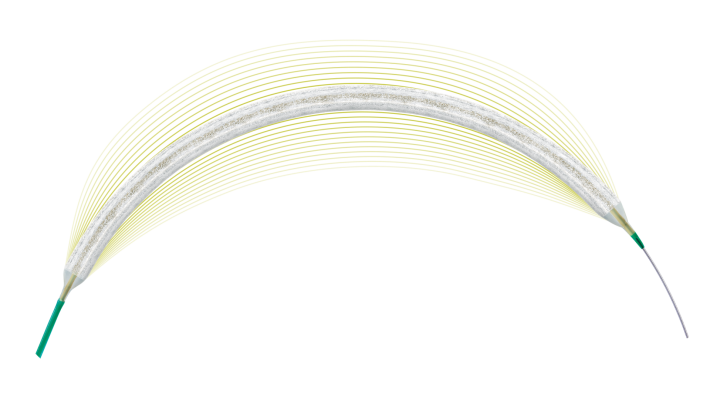|
November 28, 2022 – BIOTRONIK announced the presentation of one-year results from the investigator-initiatedBIOPACT RCT this week by Principal Investigator Dr. Koen Deloose at the Paris Vascular Insights 2022 congress. The randomized controlled non-inferiority trial evaluated the safety and efficacy of the Passeo®-18 Lux® drug-coated balloon (DCB) catheter compared to the In.Pact Admiral DCB (Medtronic), and showed excellent results for both balloons through 12 months.
The prospective, multicenter, core-lab adjudicated non-inferiority trial enrolled 302 patients in Austria, Belgium, France and Switzerland with Rutherford Class 2-4 disease. Patients were randomized 1:1 to either the Passeo-18 Lux DCB or In.Pact Admiral DCB for the treatment of stenotic, non-stented restenotic or occlusive lesions in the femoropopliteal artery.
Baseline patient and lesion characteristics were comparable across both arms, with slightly higher moderate to severe calcification in the Passeo-18 Lux arm (79.6%)1 compared to the control arm (71.1%)1.
The set non-inferiority margin of 10% was met for both primary endpoints1. The primary efficacy endpoint was freedom from clinically driven target lesion revascularization at 12 months post-procedure, which was 97.16% for Passeo-18 Lux DCB and 97.02% for In.Pact Admiral DCB (p-value = 0.0002). The primary safety endpoint was a composite of freedom from device- and procedure-related death through 30 days post-index procedure, freedom from major target limb amputation and clinically driven target vessel revascularization through 12 months post-index procedure1. Primary safety was 95.75% for Passeo-18 Lux DCB and 96.27% for the control arm (p-value = 0.0008)1.
"The excellent safety and efficacy results seen in both arms of the BIOPACT RCT clearly demonstrate the utility of paclitaxel-coated balloons for treating femoropopliteal disease. These head-to-head data help us gain essential insights and ensure the best treatments are available for our patients," said Dr. Koen Deloose, Head of the Department of Vascular Surgery, AZ Sint Blasius Hospital in Dendermonde, Belgium. "I would like to sincerely thank all of the investigators and the people of CRO ID3 medical who contributed to the collection and analysis of these valuable data."
The Passeo-18 Lux DCB has a paclitaxel dose of 3.0 µg/mm2 and uses a Butyryl-tri-hexyl citrate excipient2 (In.Pact Admiral DCB: 3.5 µg/mm2and urea excipient). The lower-profile Passeo-18 Lux DCB is on an 0.018" platform and is 4-French compatible for diameters of 2.0 to 4.0 mm and 5-French compatible for diameters of 5.0 to 7.0 mm2. In comparison, the In.Pact Admiral DCB is 5-French compatible only for its 4.0 mm diameter3, and is 6-French or 7-French compatible for its diameters of 5.0 to 7.0 mm3.
"Passeo-18 Lux DCB has an extensive and convincing body of evidence, with the BIOPACT RCT data, we once again confirm its safety and efficacy in a RCT setting," said Dr. Jörg Pochert, President Vascular Intervention at BIOTRONIK. "The BIOPACT trial upholds our position amongst leading DCBs available today."
The BIOPACT RCT study will continue collecting follow-up data at 24, 36, 48 and 60 months, which will be shared upon completion of each follow-up period.
References:
1. BIOPACT: a third head to head DCB RCT presentation by Koen Deloose, PVI Congress 2022.
2. BIOTRONIK data on file.
3. https://europe.medtronic.com/xd-en/healthcare-professionals/products/cardiovascular/drug-coated-balloons/inpact-drug-coated-balloon.htm About BIOTRONIK:
|

